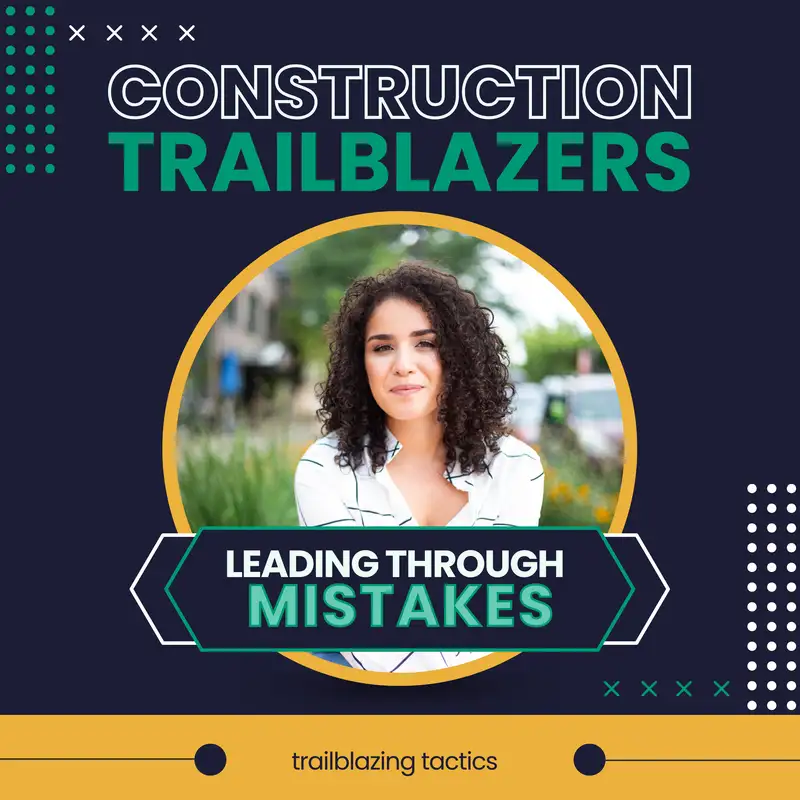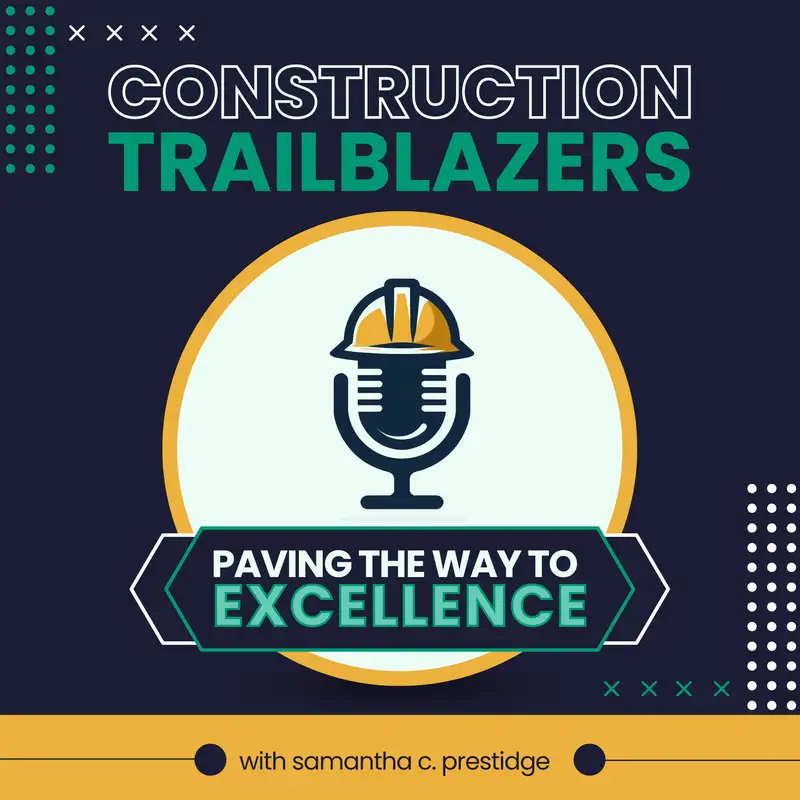2. Trailblazing Tactics: Leading Through Mistakes
Last year I was not
practicing what I preach.
I led my team astray into the confusion
that I often help my clients avoid
despite the knowledge base that I pour
into all my work with my clients, all of
my preferences for clarity and abundance
of communication and kick ass processes.
I completely messed up with my own
team, and I'm here to spill the beans
on how we got things back on track.
Hi everyone, and welcome back to
another episode of Construction
Trailblazers Paving the Way to
Excellence Your go-to podcast for
innovation, success, and a streamlined
excellence in the building industry.
I'm Samantha C.
Prestige, your host and expert
in operations and processes.
I've seen the Transformative effects
of adopting smart, efficient processes.
These changes not only boost company
revenue, but also restore peace of mind
for owners overwhelmed by the daily grind.
Today I'm sharing one of my failures
last year and the exact steps I took
with my team to get us back on track.
If you're all about leaving behind the
daily firefighting and moving towards
a future of freedom and predictable
success, then you're in the right place.
Discover more about us
and catch up on past
episodes@constructiontrailblazers.com.
All right, let's get into it.
So last year there was some exciting
successes and some not so savvy moves
that didn't pan out the way we had hoped.
It was one of those, the cos
kids have no shoes, situations.
A lot was going on for my team and
I, and on top of that, I threw in
new ideas for things we could start
doing, which kind of just compounded
all of the challenges for my team.
And one of the things that made it even
worse was that I wasn't even aware that
my team was in a state of confusion.
I was not seeing the warning flags
in the day-to-Day work that my team
didn't understand the new process
or that they were struggling.
And it wasn't until our team
feedback meeting at the end of the
year that I discovered the issue.
So we try and do team feedback
meetings twice a year.
These are kind of reverse town halls,
so in a town hall, leadership is
sharing updates, sit, uh, wins, and
some upcoming stuff with employees.
The reverse of that is when
leadership just shuts up and listens.
So this means that employees
get the chance to give their
thoughts, their opinions, and
their ideas to the leadership team.
It doesn't always turn out to be a lot of
negativity and criticism because sometimes
this is just a great opportunity to hear
some innovative ideas from your team
outside of those projects that already
have some major deadlines where you
might not always have the time or the
resources to experiment with fun ideas.
So that being said.
This is also about
identifying challenges, right?
So there's often constructive criticism
in these meetings, but that doesn't mean
it has to turn into a complaining session.
It's about identifying problems
and moving forward as a team.
So in this instance,
with my team last year.
It was awesome that we do this
because the feedback meeting
was kind of like a fail safe.
So despite how much communication
I thought I was giving my team,
there were issues that weren't being
communicated back to me or that they
were trying to tell me, but I just
wasn't understanding what was going on.
And that feedback meeting gave us
the opportunity to kind of pause
and talk through these things.
So we discovered that one of the main
reasons why some things were falling
apart was because I hadn't explained
all of my reasoning, all of the whys
behind some of the changes with my team.
So they were all operating
in their own little tunnels.
They only saw pieces of the puzzle
and weren't able to connect the
dots with the bigger picture.
Because of this, there were several
pieces of the puzzle that I not only
left undiscussed with my team, but I
left them completely unaccounted for.
This is a major step I follow with
all of my clients when we're going
through change management, but I
completely missed it with my own team.
You have to give your team the big
picture, not only so that they can get
on board and minimize that resistance
to change, but also because they will
help you understand if there's gaps in
that new process that are going to mess
things up for everyone down the line.
I'm always talking about
how your employees are, your
on the ground intelligence.
We have to value their perspectives
and their knowledge because they're the
ones doing that day-to-Day work, right?
I missed this with my team, uh, last year.
So my team, the cobblers kids were pretty
much left with sandals for a running hike.
The lesson didn't stop here.
Remembering the importance of
sharing the big picture and having
these team feedbacks meetings,
uh, was just the first step.
After this, or rather during the
conversation, I had to remember
to embrace the criticism.
There is no room for egos
in open communication.
There's absolutely no point in giving
your team the chance to speak up
and even share their challenges if
you're not entering the conversation
with humility and respect.
So the criticism is not about you.
It's not about your team
playing a blame game.
It's about proactively revealing
issues so that you can continue
to grow with a strong foundation.
One of the ways we help to
mitigate this is by prepping our
team before the meeting, so, so
before a team feedback meeting.
Usually a week or two before my
operations manager will send out
a whole list of questions for
the team to start thinking about.
It's the same questions we will
ask them during the meeting.
I want my team to spend time reflecting
on these questions so that they bring
up real issues, not just the off
the whim complaints when they hear
the question for the first time.
So since I know my team has put thought
into the issues that they're bringing up,
I'm really able to lean into that humility
and that readiness to improve rather
than coming in with a defensive mindset.
Now on top of this, making sure
that a feedback meeting isn't a
complaining session also means
making sure that there's follow up
and follow through on major issues.
In disclaimer, I do stress with my team
that not every issue will have a solution.
'cause sometimes there's just
things that we have to do a certain
way, whether they like it or not.
Other times, I wanna ensure that
the process and our priorities back
up, external customer centricity
as a first priority, and then team
satisfaction is a second priority.
But in this case, the process
was largely about internal stuff.
So In this case where I had messed
up with my team and left them without
the big picture, the follow through
meant that I needed to connect
the dots very clearly for them.
Also, since this was largely based
on an internal process, there were
things that were very much open to
changing and and being improved.
So we hosted a brainstorming session with
those team members that were experiencing
the challenges, and together we came up
with a game plan and all the action steps.
To improve the process, to clear
up those gaps, um, and make sure
everything was flowing smoothly.
So taking these steps and pulling my
team into that brainstorming step of
the process also meant that they were
leaning into a solutions oriented
approach, which is going to in the future.
It's definitely helped to minimize the
complaining aspect of team feedback
meetings and make sure that they're always
thinking about how do we problem solve?
How does this challenge or this solution
fit into our customer centricity
or our priorities and our goals?
So this all resulted in a new process.
That was very thoughtful, very strategic.
There was clarity in the workflow and
who was doing what from day to day.
So we were able to keep pushing on
with our goals, handle these new
ideas, these new changes with a, an
effective way that balanced the team
and kind of made everybody happy.
So I highly, highly recommend that
you do team feedback meetings to
just get that perspective from your
employees, get that fail safe in for
those challenges that you might not
be seeing every day, and realize that
they're not just about putting out fires.
It is more than just
simple problem solving.
It really is.
About empowering your team, staying on
top of issues and making sure that all
of your strategic decisions and all of
the changes you might be making will
make sense with your team and have the
positive impact that you're looking for.
Alright.
I'd love to hear if you'll be hosting a
team feedback meeting with your team soon,
or if you already do something like this,
then what's one of your success stories
from following this Open communication
problem solving strategy with your team.
You can share your story at.
hello@constructiontrailblazers.com
or share it with me on LinkedIn and
if you're wondering if there might
be some challenges worth discussing
with your team or even how you
might handle yourself during a team
feedback meeting, then try taking our,
what kind of business hero are you?
Quiz the quiz.
My LinkedIn and the email will
all be in the show notes for you.
All right.
Thanks for listening and we'll see you
next time on Construction Trailblazers
Paving the Way to Excellence.

